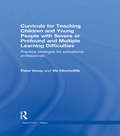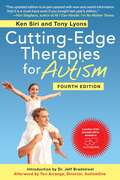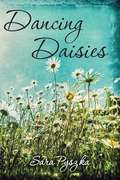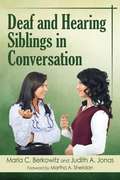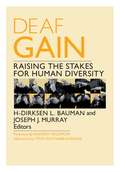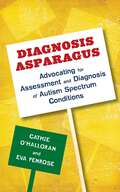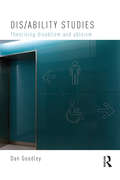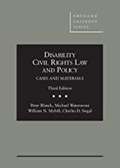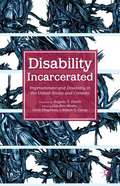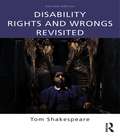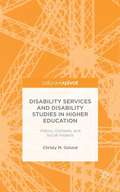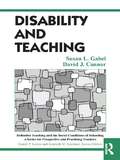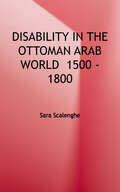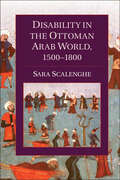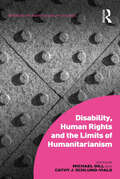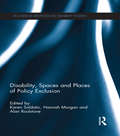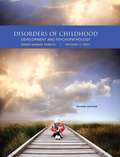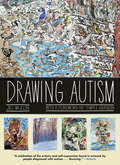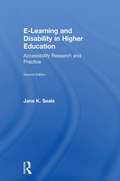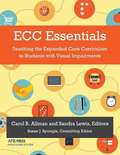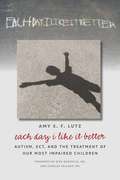- Table View
- List View
Curricula for Teaching Children and Young People with Severe or Profound and Multiple Learning Difficulties: Practical strategies for educational professionals (nasen spotlight)
by Peter Imray Viv HinchcliffeCurricula for Teaching Children and Young People with Severe or Profound and Multiple Learning Difficulties offers a range of compelling arguments for a distinct and separate pedagogical approach to the learning needs of the most educationally challenging pupils. This book, written in accessible, common sense and non-academic language, provides an easy-to-follow alternative curriculum specifically designed to enhance and enrich the learning of children with profound and multiple learning difficulties. Chapter by chapter, guidelines and support are offered in key curriculum areas, some of which include: Cognition Language, Literacy and Communication Mathematical Physical Sensory Creative Care Play Problem solving. This highly practical resource is essential reading for any educational professional, parents, school governors, teachers, teaching assistants, therapists and indeed anyone involved with maximising the educational opportunities of those with profound learning difficulties.
Cutting-Edge Therapies for Autism, Fourth Edition
by Tony Lyons Teri Arranga Ken SiriThe parents of children with autism know that learning about treatments is a full-time job. For parents with limited time, ability, or resources, Ken Siri and Tony Lyons have compiled the latest in autism research and treatment. Exploring the possible causes of autism and presenting novel therapies, medications, and interventions, Cutting-Edge Therapies for Autism contains contributions from more than ninety experts on a wide variety of research findings, therapies, models, and multifaceted evaluation and treatment centers.Revised and fully updated to include the latest developments, this fourth edition includes up-to-date information on mitochondrial, antifungal, and physical therapy treatments; about speech, art, music, and sound therapies; and how diets, HANDLE, indigenous healing, and other exciting new treatments can be used to help your child. It also addresses developing technologies, like the iPad, which provides hundreds of apps that help kids with autism communicate and organize their day, and helps parents keep track of therapy schedules. Filled with case studies and research, Cutting-Edge Therapies for Autism is a detailed and informative guide for anyone affected by autism.
Dancing Daisies
by Sara PyszkaBrynn has cerebral palsy and her relationship with her two best friends is just shattered. Brynn is looking forward more than ever to her summer at Camp Lakewood.
Deaf And Hearing Siblings In Conversation
by Marla C. Berkowitz Judith A. JonasThis is the first book to consider both deaf and hearing perspectives on the dynamics of adult sibling relationships. Deaf and hearing authors Berkowitz and Jonas conducted interviews with 22 adult siblings, using ASL and spoken English, to access their intimate thoughts. A major feature of the book is its analysis of how isolation impacts deaf-hearing sibling relationships. The book documents the 150 year history of societal attitudes embedded in sibling bonds and identifies how the siblings' lives were affected by the communication choices their parents made. The authors weave information throughout the text to reveal attitudes toward American Sign Language and the various roles deaf and hearing siblings take on as monitors, facilitators, signing-siblings and sibling-interpreters, all of which impact lifelong bonds. Included: questions for guided discussion, extensive bibliography, and other features.
Deaf Gain: Raising the Stakes for Human Diversity
by H-Dirksen L. Bauman Joseph J. MurrayDeaf people are usually regarded by the hearing world as having a lack, as missing a sense. Yet a definition of deaf people based on hearing loss obscures a wealth of ways in which societies have benefited from the significant contributions of deaf people. In this bold intervention into ongoing debates about disability and what it means to be human, experts from a variety of disciplines—neuroscience, linguistics, bioethics, history, cultural studies, education, public policy, art, and architecture—advance the concept of Deaf Gain and challenge assumptions about what is normal.Through their in-depth articulation of Deaf Gain, the editors and authors of this pathbreaking volume approach deafness as a distinct way of being in the world, one which opens up perceptions, perspectives, and insights that are less common to the majority of hearing persons. For example, deaf individuals tend to have unique capabilities in spatial and facial recognition, peripheral processing, and the detection of images. And users of sign language, which neuroscientists have shown to be biologically equivalent to speech, contribute toward a robust range of creative expression and understanding. By framing deafness in terms of its intellectual, creative, and cultural benefits, Deaf Gain recognizes physical and cognitive difference as a vital aspect of human diversity.Contributors: David Armstrong; Benjamin Bahan, Gallaudet U; Hansel Bauman, Gallaudet U; John D. Bonvillian, U of Virginia; Alison Bryan; Teresa Blankmeyer Burke, Gallaudet U; Cindee Calton; Debra Cole; Matthew Dye, U of Illinois at Urbana–Champaign; Steve Emery; Ofelia García, CUNY; Peter C. Hauser, Rochester Institute of Technology; Geo Kartheiser; Caroline Kobek Pezzarossi; Christopher Krentz, U of Virginia; Annelies Kusters; Irene W. Leigh, Gallaudet U; Elizabeth M. Lockwood, U of Arizona; Summer Loeffler; Mara Lúcia Massuti, Instituto Federal de Santa Catarina, Brazil; Donna A. Morere, Gallaudet U; Kati Morton; Ronice Müller de Quadros, U Federal de Santa Catarina, Brazil; Donna Jo Napoli, Swarthmore College; Jennifer Nelson, Gallaudet U; Laura-Ann Petitto, Gallaudet U; Suvi Pylvänen, Kymenlaakso U of Applied Sciences; Antti Raike, Aalto U; Päivi Rainò, U of Applied Sciences Humak; Katherine D. Rogers; Clara Sherley-Appel; Kristin Snoddon, U of Alberta; Karin Strobel, U Federal de Santa Catarina, Brazil; Hilary Sutherland; Rachel Sutton-Spence, U of Bristol, England; James Tabery, U of Utah; Jennifer Grinder Witteborg; Mark Zaurov.
Diagnosis Asparagus: Advocating for Assessment and Diagnosis of Autism Spectrum Conditions
by Catherine O'Halloran Eva PenroseA highly readable, insightful and sometimes humorous account of autism assessment, diagnosis and life with a 'label'. Eva was diagnosed with Asperger Syndrome (ASD) at age 11 and is now a fun-loving, sociable 16-year-old. This book, co-written with her mother, a speech and language therapist, discusses their reasons for seeking a diagnosis, the process of being assessed, their reactions to the news and the impact it has had on Eva's life. It also considers how diagnosis has helped them find strategies to lessen the challenges of living with an ASD. Concluding that it doesn't really matter whether the name for the set of traits that characterise autism changes or what it changes to, this life-affirming book shows diagnosis to be a positive and empowering experience. It will be helpful to any family embarking on the assessment process as well as professionals looking for insight into a family's diagnosis journey.
Diagnosis and treatment of blind and visually impaired
by Dolly SinghThis publication provides readers with an understanding of visual impairment and blindness, particularly the cortical visual impairment. An overview of eye diseases, low vision, vision loss, and blindness is given. Uses of assistive technology, remote infrared audible signage and GPS for visually impaired are described.
Dis/ability Studies: Theorising disablism and ableism
by Dan GoodleyIn this ground-breaking new work, Dan Goodley makes the case for a novel, distinct, intellectual, and political project – dis/ability studies – an orientation that might encourage us to think again about the phenomena of disability and ability. Drawing on a range of interdisciplinary areas, including sociology, psychology, education, policy and cultural studies, this much needed text takes the most topical and important issues in critical disability theory, and pushes them into new theoretical territory. Goodley argues that we are entering a time of dis/ability studies, when both categories of disability and ability require expanding upon as a response to the global politics of neoliberal capitalism. Divided into two parts, the first section traces the dual processes of ableism and disablism, suggesting that one cannot exist without the other, and makes the case for a research-driven and intersectional analysis of dis/ability. The second section applies this new analytical framework to a range of critical topics, including: The biopolitics of dis/ability and debility Inclusive education Psychopathology Markets, communities and civil society. Dis/ability Studies provides much needed depth, texture and analysis in this emerging discipline. This accessible text will appeal to students and researchers of disability across a range of disciplines, as well as disability activists, policymakers, and practitioners working directly with disabled people.
Disability Civil Rights Law And Policy, Cases And Materials (American Casebook)
by Peter Blanck Michael Waterstone William N. Myhill Charles D. SiegalThis casebook examines the development of disability rights law and policy in the United States and abroad and can be used as either a law or graduate school teaching tool. It gives a complete and current treatment of the Americans with Disabilities Act and the ADA Amendments Act, including the background of the statute's passage, definition of disability, discrimination in employment, public services, and public accommodations. It also gives in-depth coverage of other important federal disability discrimination statutes like the Individuals with Disabilities Education Act, Rehabilitation Act, and Fair Housing Amendments Act. This book is unique in that it offers extensive coverage of the rapidly developing area of international disability law, through discussion of the new UN Convention on Rights of Persons with Disabilities and related developments. The authors also offer detailed coverage of current policy issues involving taxation, health policy, and technology. The book has been streamlined significantly since the last edition.
Disability Incarcerated
by Allison C. Carey Chris Chapman Liat Ben-MosheDisability Incarcerated gathers thirteen contributions from an impressive array of fields. Taken together, these essays assert that a complex understanding of disability is crucial to an understanding of incarceration, and that we must expand what has come to be called 'incarceration. ' The chapters in this book examine a host of sites, such as prisons, institutions for people with developmental disabilities, psychiatric hospitals, treatment centers, special education, detention centers, and group homes; explore why various sites should be understood as incarceration; and discuss the causes and effects of these sites historically and currently. This volume includes a preface by Professor Angela Y. Davis and an afterword by Professor Robert McRuer.
Disability Rights and Wrongs Revisited
by Tom ShakespeareOver the last forty years, the field of disability studies has emerged from the political activism of disabled people. In this challenging review of the field, leading disability academic and activist Tom Shakespeare argues that disability research needs a firmer conceptual and empirical footing. This new edition is updated throughout, reflecting Shakespeare’s most recent thinking, drawing on current research, and responding to controversies surrounding the first edition and the World Report on Disability, as well as incorporating new chapters on cultural disability studies, personal assistance, sexuality, and violence. Using a critical realist approach, Disability Rights and Wrongs Revisited promotes a pluralist, engaged and nuanced approach to disability. Key topics discussed include: dichotomies – going beyond dangerous polarizations such as medical model versus social model to achieve a complex, multi-factorial account of disability identity - the drawbacks of the disability movement's emphasis on identity politics bioethics - choices at the beginning and end of life and in the field of genetic and stem cell therapies relationships – feminist and virtue ethics approaches to questions of intimacy, assistance and friendship. This stimulating and accessible book challenges disability studies orthodoxy, promoting a new conceptualization of disability and fresh research agenda. It is an invaluable resource for researchers and students in disability studies and sociology, as well as professionals, policy makers and activists.
Disability Services and Disability Studies in Higher Education: History, Contexts, and Social Impacts
by Christy M. OslundChristy Oslund explores how the divide between disability studies and disability services, which exist on college and university campuses everywhere, impacts students with disability on campus.
Disability and Special Needs
by Dolly SinghThis publication titled "Disability and Special Needs: Dimensions and Perspectives", provides readers with an understanding of disability in a wider perspective, including details about dimensions; key facts; global classification; etc.
Disability and Teaching (Reflective Teaching and the Social Conditions of Schooling Series)
by David Connor Susan GabelDisability and Teaching highlights issues of disability in K-12 schooling faced by teachers, whoare increasingly accountable for the achievement of all students regardless of the labelsassigned to them. It is designed to engage prospective and practicing teachers in examining theirpersonal theories and beliefs about disability and education. Part I offers four case studies dealing with issues such as inclusion, over-representation inspecial education, teacher assumptions and biases, and the struggles of novice teachers. Thesecases illustrate the need to understand disability and teaching within the contexts of school,community, and the broader society and in relation to other contemporary issues facing teachers.Each is followed by space for readers to write their own reactions and reflections, educators’dialogue about the case, space for readers’ reactions to the educators’ dialogue, a summary, andadditional questions. Part II presents public arguments representing different views about thetopic: conservative, liberal-progressive, and disability centered. Part III situates the authors’personal views within the growing field of Disability Studies in education and provides exercisesfor further reflection and a list of resources. Disability and Teaching is the 8th volume in the Reflective Teaching and the Social Conditions ofSchooling Series, edited by Daniel P. Liston and Kenneth M. Zeichner. This series of small,accessible, interactive texts introduces the notion of teacher reflection and develops it in relationto the social conditions of schooling. Each text focuses on a specific issue or content area inrelation to teaching and follows the same format. Books in this series are appropriate for teachereducation courses across the curriculum.
Disability and the Good Human Life
by Jerome E. Bickenbach Franziska Felder Barbara Schmitz Jerome E. Bickenbach Franziska FelderThis collection of original essays, from both established scholars and newcomers, takes up a recent debate in philosophy, sociology, and disability studies on whether disability is intrinsically a harm that lowers a person's quality of life. While this is a new question in disability scholarship, it also touches on one of the oldest philosophical questions: what is the good human life? Historically, philosophers have not been interested in the topic of disability, and when they are it is usually only in relation to questions such as euthanasia, abortion, or the moral status of disabled people. Consequently disability has been either ignored by moral and political philosophers or simply equated with a bad human life, a life not worth living. This collection takes up the challenge that disability poses to basic questions of political philosophy and bioethics, among others, by focusing on fundamental issues and practical implications of the relationship between disability and the good human life.
Disability in the Ottoman Arab World, 1500-1800 (Cambridge Studies in Islamic Civilization Ser.)
by Sara ScalenghePhysical, sensory, and mental impairments can influence an individual's status in society as much as the more familiar categories of gender, class, religion, race, and ethnicity. This was especially true of the early modern Arab Ottoman world, where being judged able or disabled impacted every aspect of a person's life, including performance of religious ritual, marriage, job opportunities, and the ability to buy and sell property. Sara Scalenghe's book is the first on the history of both physical and mental disabilities in the Middle East and North Africa, and the first to examine disability in the non-Western world before the nineteenth century. Unlike previous scholarly works that examine disability as discussed in religious texts such as the Qur'an and the Hadith, this study focuses on representations and classifications of disability and impairment across a wide range of biographical, legal, medical, and divinatory primary sources.
Disability in the Ottoman Arab World, 1500-1800 (Cambridge Studies in Islamic Civilization)
by Sara ScalenghePhysical, sensory, and mental impairments can influence an individual's status in society as much as the more familiar categories of gender, class, religion, race, and ethnicity. This was especially true of the early modern Arab Ottoman world, where being judged able or disabled impacted every aspect of a person's life, including performance of religious ritual, marriage, job opportunities, and the ability to buy and sell property. Sara Scalenghe's book is the first on the history of both physical and mental disabilities in the Middle East and North Africa, and the first to examine disability in the non-Western world before the nineteenth century. Unlike previous scholarly works that examine disability as discussed in religious texts such as the Qur'an and the Hadith, this study focuses on representations and classifications of disability and impairment across a wide range of biographical, legal, medical, and divinatory primary sources.
Disability perspective in rehabilitation
by Rajesh Kr Verma Pragya VermaThis book will give the brief history about mental retardation, hearing impairment, visual impairment, autism spectrum disorder, learning disabilities, deaf blind and cerebral palsy and how the developments has been taken place in India and abroad. This book also contains different National and International Acts/Policies benefits for the persons with disabilities globally.
Disability, Human Rights and the Limits of Humanitarianism (Interdisciplinary Disability Studies)
by Michael Gill Cathy J. Schlund-VialsDisability studies scholars and activists have long criticized and critiqued so-termed ’charitable’ approaches to disability where the capitalization of individual disabled bodies to invoke pity are historically, socially, and politically circumscribed by paternalism. Disabled individuals have long advocated for civil and human rights in various locations throughout the globe, yet contemporary human rights discourses problematically co-opt disabled bodies as ’evidence’ of harms done under capitalism, war, and other forms of conflict, while humanitarian non-governmental organizations often use disabled bodies to generate resources for their humanitarian projects. It is the connection between civil rights and human rights, and this concomitant relationship between national and global, which foregrounds this groundbreaking book’s contention that disability studies productively challenge such human rights paradigms, which troublingly eschew disability rights in favor of exclusionary humanitarianism. It relocates disability from the margins to the center of academic and activist debates over the vexed relationship between human rights and humanitarianism. These considerations thus productively destabilize able-bodied assumptions that undergird definitions of personhood in civil rights and human rights by highlighting intersections between disability, race, gender ethnicity, and sexuality as a way to interrogate the possibilities (and limitations) of human rights as a politicized regime.
Disability, Spaces and Places of Policy Exclusion (Routledge Advances in Disability Studies)
by Alan Roulstone Karen Soldatic Hannah MorganGeographies of disability have become a key research priority for many disability scholars and geographers. This edited collection, incorporating the work of leading international disability researchers, seeks to expand the current geographical frame operating within the realm of disability. Providing a critical and comprehensive examination of disability and spatial processes of exclusion and inclusion for disabled people, the book uniquely brings together insights from disability studies, spatial geographies and social policy with the purpose of exploring how spatial factors shape, limit or enhance policy towards, and the experiences of, disabled people. Divided into two parts, the first section explores the key concepts to have emerged within the field of disability geographies, and their relationship to new policy regimes. New and emerging concepts within the field are critically explored for their significance in conceptually framing disability. The second section provides an in-depth examination of disabled people’s experience of changing landscapes within the onset of emerging disability policy regimes. It deals with how the various actors and stakeholders, such as governments, social care agencies, families and disabled people traverse these landscapes under the new conditions laid out by changing policy regimes. Crucially, the chapters examine the lived meaning of changing spatial relations for disabled people. Grounded in recent empirical research, and with a global focus, each of the chapters reveal how social policy domains are challenged or undermined by the spatial realities faced by disabled people, and expands existing understandings of disability. In turn, the book supports readers to grasp future policy directions and processes that enable disabled people's choices, rights and participation. This important work will be invaluable reading for students and researchers involved in disability, geography and social policy.
Disorders of Childhood: Development and Psychopathology
by Robin Hornik Parritz Michael F. TroyWritten with the whole child in mind, this book discusses disorders in connection with the different stages of development, providing both a meaningful framework to promote learning. The authors emphasize multi-factor explanations of disorders as well as developmental frameworks and developmental pathways--presenting disorders and sets of disorders in the order in which they typically appear in a child's life. They also focus on the child-in-context (calling attention to the multiple settings in which the child is embedded) and emphasize the importance of taking a broad view that considers the whole child and his or her patterns of interest, abilities, and strengths, rather than a narrow view of a disorder or developmental delay. As a result of this holistic approach, which reflects the most up-to-date understanding of child and adolescent psychopathology, readers learn to think about disorders in the same way that caring adults think about disorders they encounter every day--in terms of an individual child who is coping with distress and dysfunction. Available with InfoTrac Student Collections http://gocengage.com/infotrac.
Drawing Autism
by Jill MullinThis &“jaw-droppingly beautiful book&” explores the work and creative process of artists diagnosed with ASD, with a foreword by Temple Grandin (Library Journal). In this volume, behavior analyst and educator Jill Mullin has assembled a staggering array of work from established artists with autism like Gregory Blackstock and Jessica Park—as well as many who are unknown but no less talented. Their creations, coupled with artist interviews, comprise a fascinating and compelling book that serves to educate and inspire anyone who knows someone diagnosed with ASD. Mullin&’s introduction and the foreword by bestselling author Temple Grandin also provide an overview of autism, and advocate for nurturing the talents, artistic and otherwise, of autistic individuals. &“What is the actual experience of living with autism in a deep-felt sense, beyond the social stereotypes and headline-worthy superskills? Drawing Autism, a celebration of the artistry and self-expression found in artwork by people diagnosed with autism, explores just that. The stunning volume features works by more than fifty international contributors, from children to established artists, that illustrate the rich multiplicity of the condition.&” —The Atlantic &“Mullin . . . brings together fascinating works by 40 artists on the spectrum with their answers to her questions about their process.&” —The Boston Globe &“A testament to the power of art to reveal the inner world of people living with ASD.&” —Publishers Weekly
E-Learning and Disability in Higher Education: Accessibility Research and Practice
by Jane K. SealeMost people working within the higher education sector understand the importance of making e-learning accessible to students with disabilities, yet it is not always clear exactly how this should be accomplished. E-Learning and Disability in Higher Education evaluates current accessibility practice and critiques the extent to which 'best' practices can be confidently identified and disseminated. This second edition has been fully updated and includes a focus on research that seeks to give 'voice' to disabled students in a way that provides an indispensible insight into their relationship with technologies and the institutions in which they study. Examining the social, educational, and political background behind making online learning accessible in higher and further education, E-Learning and Disability in Higher Education considers the roles and perspectives of the key stake-holders involved in e-learning: lecturers, professors, instructional designers, learning technologists, student support services, staff developers, and senior managers and administrators.
ECC Essentials: Teaching The Expanded Core Curriculum To Students With Visual Impairments
by Carol B. AllmanThe book discusses the nine ECC content areas along with relevant assessments, the important roles of teachers of students with visual impairments as well as their students' parents, and learning activities and resources.
Each Day I Like It Better: Autism, ECT, and the Treatment of Our Most Impaired Children
by Amy LutzIn the fall of 2009, Amy Lutz and her husband, Andy, struggled with one of the worst decisions parents could possibly face: whether they could safely keep their autistic ten-year-old son, Jonah, at home any longer. Multiple medication trials, a long procession of behavior modification strategies, and even an almost year-long hospitalization had all failed to control his violent rages. Desperate to stop the attacks that endangered family members, caregivers, and even Jonah himself, Amy and Andy decided to try the controversial procedure of electroconvulsive therapy or ECT. Over the last three years, Jonah has received 136 treatments. His aggression has greatly diminished, and for the first time Jonah, now fourteen, is moving to a less restricted school. Each Day I Like It Better recounts the journeys of Jonah and seven other children and their families (interviewed by the author) in their quests for appropriate educational placements and therapeutic interventions. The author describes their varied, but mostly successful, experiences with ECT. A survey of research on pediatric ECT is incorporated into the narrative, and a foreword by child psychiatrist Dirk Dhossche and ECT researcher and practitioner Charles Kellner explains how ECT works, the side effects patients may experience, and its current use in the treatment of autism, catatonia, and violent behavior in children.
